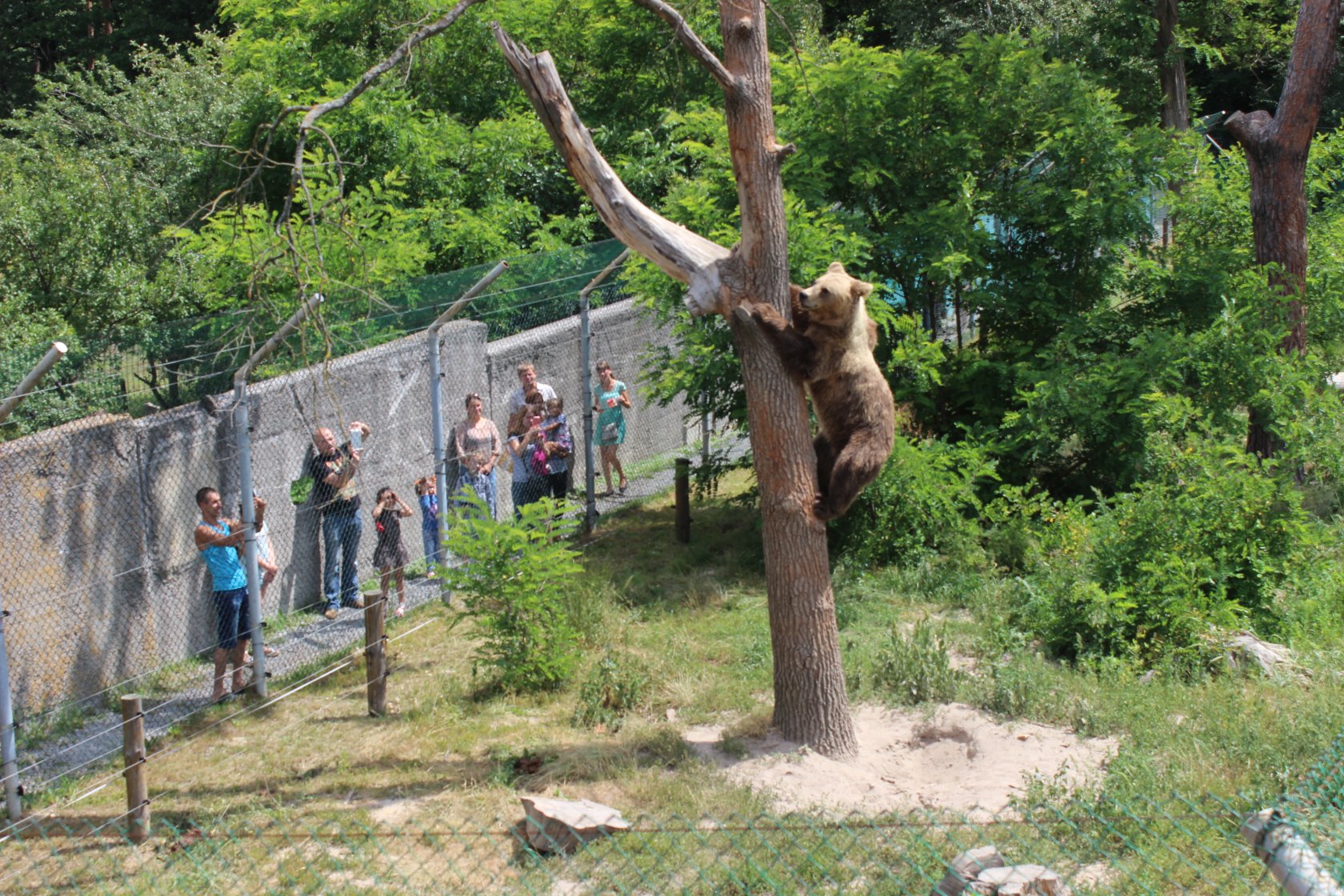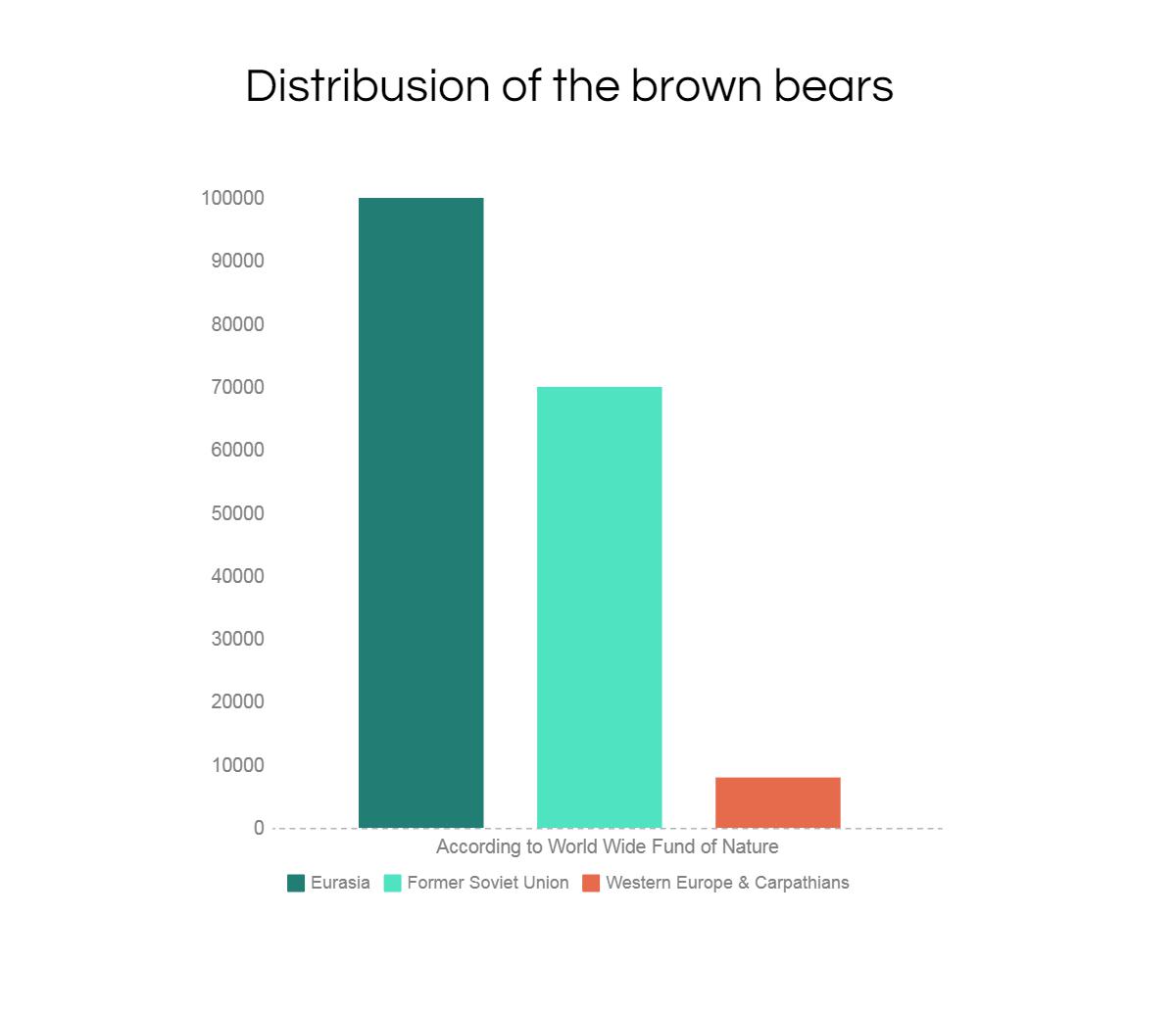INTERNATIONAL school of multimedia journalism
lviv 2017
lviv 2017
Bear Necessities
What is a Good Life for Bears?
1
No Bees buzzing in the Trees
Masha the bear has never really experienced what living freely means. She spend almost all her life in captivity under questionable conditions. Her mother was killed when she was just a baby, she was taken by an unknown man and put into a cage.
Someday strangers came by and asked "What are you doing to that animal? Why are you keeping it like that? Give it to us!" The man replied "100 dollars and it's yours".
They agreed and that's how Masha the bear came to the restaurant Hutsul Dvir in Lviv.
Someday strangers came by and asked "What are you doing to that animal? Why are you keeping it like that? Give it to us!" The man replied "100 dollars and it's yours".
They agreed and that's how Masha the bear came to the restaurant Hutsul Dvir in Lviv.
The restaurant is located in a big shopping center near the airport. Petro Pisarchuk is the owner of the whole area. He is a rich man, well known. His version of the story:
When we built this restaurant, the workers went to the mountains to lumber wood for construction. There was this animal in the area. The previous owner did not know what to do with the bear and how to feed it. Leaving the animal in the woods would have meant death for her. So we found an agreement and brought him to the restaurant. Here, we created conditions that are better than in many zoos. The bear is healthy and gets enough food.
Healthy and sated Masha has been in the cell for 15 years. Every day, dozens of people come to the restaurant to eat and look at the wild beast.
"Masha, Mashenka!" - some little girls are shouting excited, standing in front of the gate. The bear doesn't give them any attention, only walks alongside the bars. Sometimes Masha bathes in her little pond, scares some cheeky birds, scratches her back. There is not much more to do here.
Bear`s Facts
Most of bears in captivity in Ukraine are brown bears.
1
Brown Bears are solitary animals and only meet for mating
2
Bad at hunting
3
Good at climbing
4
Can run up to 50 km/h
5
Nocturnal
2
A Bear can't Rest at Ease
"Since 2005, the administration of the restaurant is looking for a possibility of transferring the bear to a wildlife reserve that meets the required norms" - is written on a board next to Masha's cell.
The owners say they have been seeking a suitable shelter for the animal for 12 years.
Five years ago, numerous organizations and visitors began to contact Hutsul Dvir. They appealed to improve the living conditions of Masha and to transfer it to an appropriate shelter.
Five years ago, numerous organizations and visitors began to contact Hutsul Dvir. They appealed to improve the living conditions of Masha and to transfer it to an appropriate shelter.
Three years ago Natalya Vyshnevska and her organization requested in an open letter to the owners of the restaurant that the animal should be transferred to Synevir rehabilitation center in Transcarpathia, which was opened in 2014.
The conditions are not suitable, it is clear that the bears there are sick. I wanted to take a bear in Sinewyr, but the owners did not want to give it away. They said far away.
Natalia Vyshnevska and her colleagues even went to court, so Masha's owners would send her to an asylum in Transcarpathia. The court's decision: "50 Hryvnas (About: 2 Euro / 5 Lari / 13 Krones) fine and a warm advice to improve the conditions of the bear".
“They did not have any documents for keeping the animal. Nobody in Ukraine has them, because there is no procedure for obtaining these documents. Our legislation does not foresee this, and the ministry does not care what will happen to wild animals. They are kept in cages, they train dogs for hunting and mock in a circus,“ - said Vyshnevska.
The owner of the restaurant, Petro Pysarchuk, is guiding through the property .
Please, listen to the original comment of bear owner below.
"We were ready to give the bear away, but "Synevyr" was overcrowded. Several years ago, they decided that Masha would move to a new reserve built near Lviv. We would be glad to move Masha, as it is not easy to feed and hold it"
- Ulyana Koptsyuk.
Ulyana Koptsyuk spokeswoman of Hutsul Dvir said that in fact, activists are only trying to draw attention to themselves and their organisation through Masha's story. The bear lives in the restaurant for 15 years, but only in the past five years people began to get interested in her welfare. For journalists, Ulyana Kopukha has already prepared all the papers: Masha's passport, her nutrition plan and medical documents.
Please, listen to a recording of a conversation between the bear`s owner with one of the representers of NGO "Four Paws'
"We have been waiting for this for a long time. I will call the coordinator of the shelter right away and ask if they finally take it!" - said Petro Pisarchuk, owner of the restaurant.
Mr. Pysarchuk dials the number on the phone and calls someone.
Igor? Here are these journalists again! When will you take the bear? How much can you take in the shelter? What? In August. Fine.
They have been building it for three years! Go there and see what they have been doing so long. There, the Austrians build a new shelter for bears and in a month Masha will move. We actually need this space, where the cage is right now. We could not let her out into the forest simply because she would die. The "Synevir" in Transcarpathia is overcrowded, so the only option is to wait for an asylum in the Lviv region.
They have been building it for three years! Go there and see what they have been doing so long. There, the Austrians build a new shelter for bears and in a month Masha will move. We actually need this space, where the cage is right now. We could not let her out into the forest simply because she would die. The "Synevir" in Transcarpathia is overcrowded, so the only option is to wait for an asylum in the Lviv region.
3
domazhyr
The village Domazhyr is located twenty kilometers from Lviv. You can get here by two buses from the city or drive half an hour by your own car. Here, in a territory of 15 hectares, a large shelter for bears is being built.
Dozens of spacious vaults, swimming pools, various toys for animals. Three years ago the Austrian international organization "Four Paws" decided to build a shelter for twenty bears.
Dozens of spacious vaults, swimming pools, various toys for animals. Three years ago the Austrian international organization "Four Paws" decided to build a shelter for twenty bears.
Shelter plan in Domazhyr

Created by Andreas Horn, architect, Berlin, Germany
One of the first inhabitants of the shelter is Potap. In one month Potap's neighbour will be Masha from the restaurant Hutsul Dvir.
4
BEARS FOR PROGRESS
Igor Stoyko, is the head of the village Domazhyr. His predecessor has signed the contract with the austrian organization Four Paws to build a bear-shelter near the city. For 20 hectares, the organisation pays a symbolic prize of 4000 Hryvnas (About 119 Euro / 370 Lari / 1003 Krones) per month.
You cannot even see wolves here. Imagine how it must be for locals to suddenly have 20 bears near the village! It will be a tourist-attraction and we hope that with the shelter also come new roads, that the organisation will also improve infrastructure in the area. Working together with an international organization makes it easier to get international grants, which the village desperately needs to improve streets, city lights and do other repairs. Also it will attract more investments to the area.
In his office the mayor, besides books and sports awards, has a lot of bear related things. Bags, calendars, small statuettes and a large wooden bear.
"We bought this wooden bear before the Austrians arrived. The same we gave to them as a gift. In September they will bring us real bears instead" - says Stoyko laughing.
"We bought this wooden bear before the Austrians arrived. The same we gave to them as a gift. In September they will bring us real bears instead" - says Stoyko laughing.
5
Rights to all the Animals
The story of Four Paws
Four Paws is an animal rights organization which operates worldwide. According to their website, their mission is to help animals in need, create legal frameworks and change the behaviour of humans towards animals. Four Paws has projects concerning wild animals, zoo animals but also pets. The organisation was founded by austrian vet Heli Dungler in 1988.
First the organisation was only active in Austria, but now in 2017, has projects in 12 countries. Besides the good work, Four Paws does, it also gets criticized. The leading german consumer safety group "Stiftung Warentest" has investigated the major animal- and environmental protection organisations in Germany.
Among others, they classified Four Paws as inefficient and uneconomic. Four Paws generates a lot of money through donations but spends too much on advertisements and for organisational matters. Also their advertisement gets classified as too aggressive.
First the organisation was only active in Austria, but now in 2017, has projects in 12 countries. Besides the good work, Four Paws does, it also gets criticized. The leading german consumer safety group "Stiftung Warentest" has investigated the major animal- and environmental protection organisations in Germany.
Among others, they classified Four Paws as inefficient and uneconomic. Four Paws generates a lot of money through donations but spends too much on advertisements and for organisational matters. Also their advertisement gets classified as too aggressive.
Heli Dungler - Founder
Heli Dungler was born 1963 in Waidhofen an der Thaya, a small town in Lower Austria. He studied veterinary medicine, worked at Greenpeace and in the Austrian environmental department. In 1988 he founded Four Paws. He still is the president of the organisation. Besides that Dungler is also chairman of the World Society for the Protection of Animals (WSPA) and the Eurogroup for Animals.
Heli Dungler's activism started during his years at university. There they stilll taught, that battery farming for chickens is the best way for keeping them. "What a nonsense" thought Dungler and quit. Later he got active against fur farms in Austria and through the movement against these farms, the organization Four Paws got formed.
Heli Dungler's activism started during his years at university. There they stilll taught, that battery farming for chickens is the best way for keeping them. "What a nonsense" thought Dungler and quit. Later he got active against fur farms in Austria and through the movement against these farms, the organization Four Paws got formed.
Four Paws has 13 offices in the world

Four Paws wants to create a world where humans treat animals with respect. They are operating in 13 different countries: Australia, Austria, Bulgaria, Germany, Belgium, Hungary, Netherlands, USA, South Africa, United Kingdom, Romania, Switzerland and Ukraine.
6
ZHYTOMYR
Residents of the village Berezivka, in the region Zhytomyr, have become accustomed to bears in the asylum by "Four paws". In 2005 the first bear, also named Masha, arrived. She was taken away from hunters, which train their dogs with bears. Through attacking the bear, which is held on a leash, dogs learn how to behave towards wild animals.
Bears with history
Each of Masha's neighbors in Zhytomyr has its own story. Julia and Olga were taken from the circus. Julia was blinded there so she would not be afraid of people.
| Groshik Groshik was part of a journalistic investigation. He was offered for sale on the internet by poachers. Journalists from an Ukrainian TV channel bought the animal and revealed their identity. Groshik's biggest achievement that day was, to climb a high tree. That's a bear's life. |
Not only Honey
Shelter-worker Olexander feeds his pets three times a day. He says that it is important to create an exciting experience for the bear. Feeding has to turn into a game. Bread, fruit, boiled eggs, vegetables and meat are hidden from the bears all over the place. Then the task for the animals is - to find the food.
In real world, these bears would not be able to care for themselves. The bear Mother teaches her children to survive in the wild. We try to create conditions that are as close as possible to the real world.
Security measures have to be very high. Electronic wires are stretched along the fence of the enclosure, so animals won't get close to it. People and animals are not afraid of each other. Masha from Zhitomir swims in her lake, looks for food everywhere and runs around, towards curious visitors and back. Alexander says when the shelter near Lviv will be completed, Masha and other larger bears will move there.
7
BearS AROUND THE WORLD
URSUS
Ursus – the old name of bear in Latine. According to "Mammal Species of the World" magazine, there are 4 main kinds , living today:

Brown bear

Polar bear

Asian black bear

American black bear
The brown bear has the widest distribution of any living kinds.
| World Wide Fund of Nature According to WWF (World Wide Fund of Nature), approximately 100,000 brown bears are estimated to live in Eurasia, and about 70,000 of those are found in the former Soviet Union. 8,000 brown bears - to remain in western Europe and the Carpathians (Slovakia, Poland, Ukraine, Romania) |
© Badri Vadachkoria
Georgia
Brown Bears populate the forests of Georgia but also are on the country's Red list for endangered species. There are some cases of illegal sale and torturing of bears. Poaching of endangered animals in Georgia is common practice. Bears are often captured and held in captivity illegally.
According to the latest data nearly 800 bears live freely in nature and more than 25 bears are held in captivity in restaurants and private territories. Mostly bear mothers get killed to give their cubs to monasteries and churches as a gift.
Bear in Svetitskhoveli Cathedral
Bear in monaatery in Borjomi, Georgia
(video was taken from youtube channel "Borjomi Live")
(video was taken from youtube channel "Borjomi Live")
In 2016 one case moved the public:
On the online-platform "mymarket.ge" a person was selling bear cubs for 55 $ each. The advert was the following: "
On the online-platform "mymarket.ge" a person was selling bear cubs for 55 $ each. The advert was the following: "

"Three bear cubs for sale. They have all vaccinations and are just 4 months old. I sell them for a symbolic price." But some days later Maia Chkhobadze, head of the Environmental Supervision Department, announced, that the advert was fake.
(Photo was taken from Facebook page "Bears in Georgia")
(Photo was taken from Facebook page "Bears in Georgia")
Illegal hunting of bears is a criminal act in Georgia – the fine for damages caused to the environment by illegal hunting or killing of one bear is about 50 thousand Georgian Lari. (About: 542.000 Hryvnas / 19.000 Euro / 136.000 Danish Krone)
Paragraph 853 of the Administrative Code of Georgia says the following:
"Killing of wild animals, which species are enlisted in the Red List of Georgia, and are close to extinction, destruction of their eggs, dens and other dwellings, that may cause their death, population decline or disruption of living environment and/or, in specific cases, stipulated by law, hunting of such animals with breach of established limitations/conditions, their sale-purchase without respective license or capture shall lead to fines from 150 to 850 Georgian Lari; private items used as weapons during the abovementioned illegal act shall be confiscated along with the obtained animal(s)."
"Killing of wild animals, which species are enlisted in the Red List of Georgia, and are close to extinction, destruction of their eggs, dens and other dwellings, that may cause their death, population decline or disruption of living environment and/or, in specific cases, stipulated by law, hunting of such animals with breach of established limitations/conditions, their sale-purchase without respective license or capture shall lead to fines from 150 to 850 Georgian Lari; private items used as weapons during the abovementioned illegal act shall be confiscated along with the obtained animal(s)."
AUSTRIA
Wild bears in Austria are rare. Today, 25-30 bears live in captivity, officially bears in the wild were extinct since 1900, but 40 years ago they resettled slowly in Austrian territory. in 1972 so called „Ötscherbär" came to the country.
With a female bear from Croatia, brought to the area by rangers, they conceived offspring, but this line ended in 2011. After an investigation organization WWF comes to the result, that only five to eight wild bears live in Austria. Most of them come from Slovenia and Italy and enter the country in the south parts Corinthia and eastern Tyrol. But the animals mostly don't stay long.
They sometimes come for winter sleep sometimes for mating. In Slovenia the amount of wild bears is that high so to sustain a balance in the forest, bears have to be shot after a schedule. But still those bears mostly don't cross the Austrian border. Scientists still have to find out why.
Through EU-wide project DinAlp, bears should be brought back to the Alps again. Scientists from Croatia, Slovenia, Italy and Austria are working together to make this happen. They first have to determine where the bears live now and on which routes they are moving. As the bear doesn't care about borders he crosses them as he pleases and it's hard to gain consistent data.
Biggest threat to bears are humans
People are afraid of them, farmers fear to loose their stock and crops. But the fear is mostly unfounded. If there is enough food and space for bears, they avoid human contact and villages anyway. But bears also get attracted by landfills and trash. One solution can be bear-safe trash cans and educating society. This education should not only contain safety instructions, should one come in the very unlikely situation of encountering a wild bear. Bears are not dangerous under normal conditions.
8
tHE END
TEAM
AUT - Diana Köhler
GEO - Nanuka Zurabovna
UA - Daria Prokaza
Mentor - Omelyan Oshchudlyak
GEO - Nanuka Zurabovna
UA - Daria Prokaza
Mentor - Omelyan Oshchudlyak
LVIV 2017







